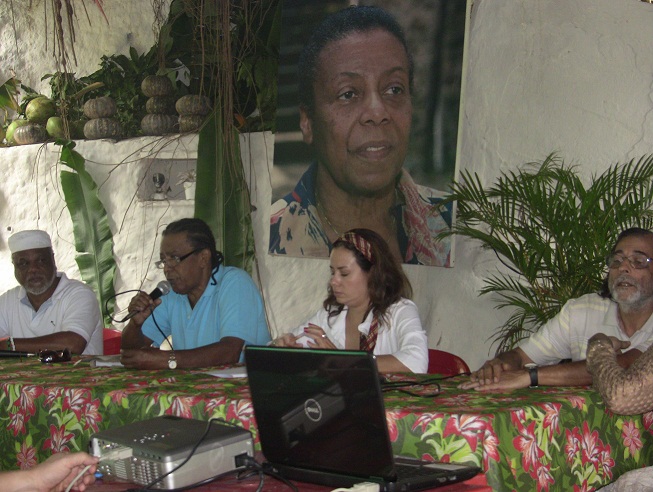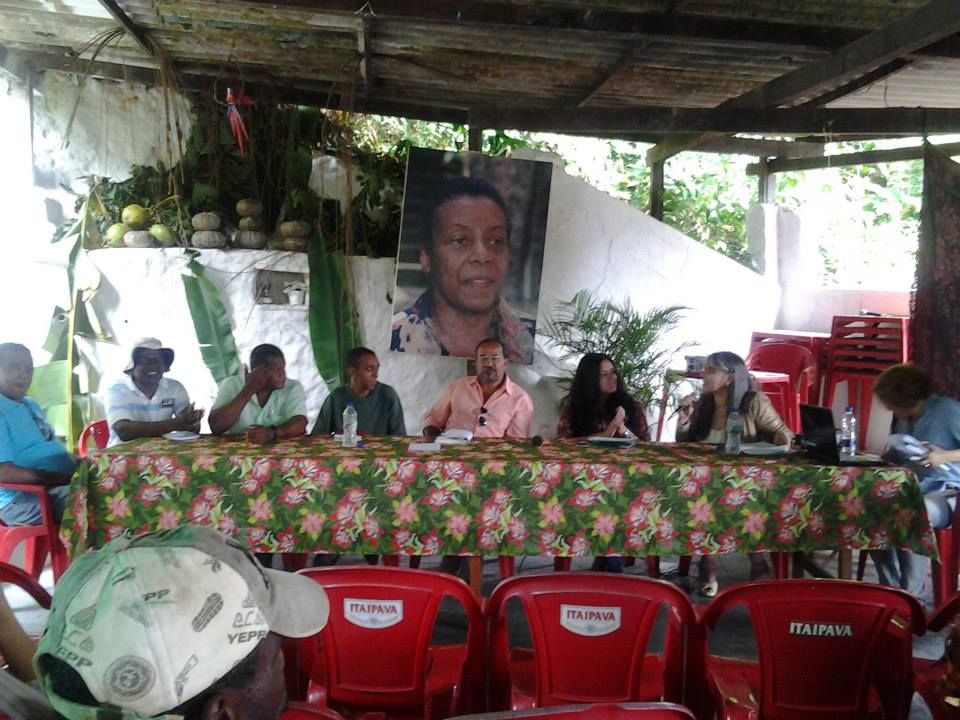 The first Quilombo Alert meeting, held by the Justice Forum and AQUILERJ (the Quilombo Association of Rio de Janeiro), took place on October 25 at the Sacopã Quilombo.
The first Quilombo Alert meeting, held by the Justice Forum and AQUILERJ (the Quilombo Association of Rio de Janeiro), took place on October 25 at the Sacopã Quilombo.
The Sacopã Quilombo is in the affluent Lagoa neighborhood and is made up of eight families descended from slaves who have lived on a 2.4-hectare site surrounded by native forest for over 100 years.
The quilombo has views of Rodrigo de Freitas Lagoon and the Christ the Redeemer statue and used to have a traditional samba and feijoada (pork and bean stew) get-together, only for it to be banned through a court injunction after complaints by residents of the neighboring condominiums.
The community is seeking recognition of its right to ownership of the land they have occupied for decades. Historically quilombos were communities slaves escaped to during slavery. However, with the 1988 Constitution the term quilombo took on a new meaning,* and quilombo issues began being addressed by public policies.
The Brazilian Constitution of 1988 guaranteed quilombo communities the right to land and the preservation of their culture. Currently there are more than 3,500 such communities across the country. However, in the past twenty-five years, few have received titles. Moreover, quilombo communities are social groups whose ethnic identity distinguishes them from the rest of society.
The meeting on October 25 brought together public defenders, academics and quilombo leaders to discuss the challenges these communities face in Brazil. The event began with a solemn opening ceremony with a representative of Afro-Brazilian religions, Ivanir Santos, who gathered together the oldest members of the community around a tree for a short prayer.
Community leaders put forward their doubts relating to land ownership to the public defenders from the Justice Forum and lawyers from the National Institute for Colonization and Agrarian Reform (INCRA).
 The first debate brought together Ivanir dos Santos of the Center for Articulations of Marginalized Peoples (CEAP) and Commission to Combat Religious Intolerance (CCIR), Luiz Sacopã, a community leader from Sacopã, and Miguel, an anthropologist from INCRA. In this session, the process regarding the titling of quilombo land was discussed, and in particular the cases of the Sacopã Quilombo, the Marambaia Quilombo, and the São José da Serra Quilombo.
The first debate brought together Ivanir dos Santos of the Center for Articulations of Marginalized Peoples (CEAP) and Commission to Combat Religious Intolerance (CCIR), Luiz Sacopã, a community leader from Sacopã, and Miguel, an anthropologist from INCRA. In this session, the process regarding the titling of quilombo land was discussed, and in particular the cases of the Sacopã Quilombo, the Marambaia Quilombo, and the São José da Serra Quilombo.
The event was supported by the Fluminense Federal University (UFF), Rio de Janeiro State University (UERJ), North Fluminense State University (UENF), and the Federal University of the State of Rio de Janeiro (UNIRIO), and was sponsored by the Justice Forum, INCRA and SINDIPETRO.
During the academic roundtable, André Videira (UFRRJ), Javier Lifschitz (UNIRIO), Elaine Monteiro (UFF), and Ronaldo Lobão (UFF) discussed the status of quilombos in Brazil today, as well as raising political, juridical and cultural issues relating to the communities.
Various community leaders from quilombos across the state of Rio de Janeiro participated, including those from Sacopã, Marambaia, Pedra do Sal, Deserto Feliz and Lagoa Feia.
According to professor André Videira from UFRRJ, no progress has been made following Lula’s government with regard to the titling of quilombo land. Indeed, there has been political regression with six times less land titling compared to the previous government.
For Damião Braga, leader of the Pedra do Sal Quilombo, no political party is in dialogue with the quilombos. He added that in 2012 there were resources available but no political will to title quilombo land; indeed, the only resources the government used went to NGOs and not to quilombo communities.
The event was an important discussion about the future of these communities that are embroiled in a fight for official recognition of their land and to become visible in Brazilian society.
Javier Lifschitz, a professor from UNIRIO, spoke of the importance of having held this event in the Sacopã quilombo: “This is the first of many other meetings to discuss topics of national interest, and there is a pressing need to debate the quilombos and questions relating to the future of these communities.”
 In the last discussion, quilombo community leaders raised very relevant questions, above all concerning the settlement of territories as well as the non-compliance of laws designed to protect quilombos. A lawyer from INCRA was also present to answer questions.
In the last discussion, quilombo community leaders raised very relevant questions, above all concerning the settlement of territories as well as the non-compliance of laws designed to protect quilombos. A lawyer from INCRA was also present to answer questions.
The representative from Deserto Feliz Quilombo said that in his region, São Francisco de Itabapoana, a new port is set to be built alongside the current Açu Port (petroleum industry port). This, he said, will bring damaging and potentially catastrophic consequences to the community, as fishing and natural oyster farming in the area will have to stop.
Luís highlighted that the Sacopã quilombo is a point of reference for the other quilombos as it is located in the most expensive square meter of the city. He spoke about the judicial action regarding the removal of the community and the possession of the land as requested by a real estate firm had never heard of a quilombo. The case will be heard on November 20, which is Afro-Brazilian Awareness Day or the day of Zumbi – a prominent historical quilombo figure, regarded as a hero and a freedom fighter. For Luís, “only a black person knows what he is going through,” even moreso when he lives in a place that is “surrounded by white, powerful people, and sometimes racists, who say that we are not in our place.”
This event was very important for the quilombo communities as it marks the beginning of a strengthening in the articulation and communication between communities, and it makes their fight increasingly visible.
According to Adriano de Lima, ex-president of AQUILERJ: “Quilombo Alert is an excellent name as for us it is vital to stop and reflect. We cannot sit here thinking that our issues were fully addressed today.”
*Modern-day quilombos’ land and cultural rights were established in Brazil’s 1988 constitution. These are areas where direct descendants of freed slaves can still be found today. Their rights are akin to those of indigenous communities in Brazil.
Thaís Rosa Pinheiro is undertaking her MA in Social Memory at UNIRIO, researching community tourism in quilombo communities
